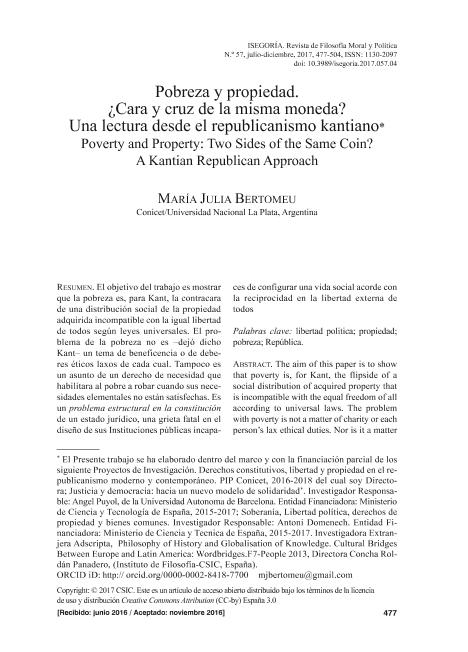Artículo
El objetivo del trabajo es mostrar que la pobreza es, para Kant, la contracara de una distribución social de la propiedad adquirida incompatible con la igual libertad de todos según leyes universales. El problema de la pobreza no es –dejó dicho Kant– un tema de beneficencia o de deberes éticos laxos de cada cual. Tampoco es un asunto de un derecho de necesidad que habilitara al pobre a robar cuando sus necesidades elementales no están satisfechas. Es un problema estructural en la constitución de un estado jurídico, una grieta fatal en el diseño de sus Instituciones públicas incapaces de configurar una vida social acorde con la reciprocidad en la libertad externa de todos The aim of this paper is to show that poverty is, for Kant, the flipside of a social distribution of acquired property that is incompatible with the equal freedom of all according to universal laws. The problem with poverty is not a matter of charity or each person’s lax ethical duties. Nor is it a matter of a law of necessity which would enable the poor to steal when their basic needs are not met. Rather, it is a structural problem in the formation of a state, a fatal flaw in the design of public institutions, which are unable to set up a social life that is in line with reciprocity in external freedom of all.
Pobreza y propiedad. ¿Cara y cruz de la misma moneda? Una lectura desde el republicanismo kantiano
Título:
Poverty and Property: Two Sides of the Same Coin? A Kantian Republican Approach
Fecha de publicación:
11/2017
Editorial:
Consejo Superior de Investigaciones Científicas. Instituto de Filosofía
Revista:
Isegoria
ISSN:
1130-2097
Idioma:
Español
Tipo de recurso:
Artículo publicado
Clasificación temática:
Resumen
Palabras clave:
Libertad PolÍTica
,
Propiedad
,
Pobreza
,
Republica
Archivos asociados
Licencia
Identificadores
Colecciones
Articulos(SEDE CENTRAL)
Articulos de SEDE CENTRAL
Articulos de SEDE CENTRAL
Citación
Bertomeu, Maria Julia; Pobreza y propiedad. ¿Cara y cruz de la misma moneda? Una lectura desde el republicanismo kantiano; Consejo Superior de Investigaciones Científicas. Instituto de Filosofía; Isegoria; 57; 11-2017; 477-504
Compartir
Altmétricas




